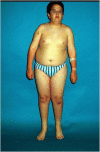Oral disorders in children with Prader-Willi syndrome: a case control study
- PMID: 32041633
- PMCID: PMC7011482
- DOI: 10.1186/s13023-020-1326-8
Oral disorders in children with Prader-Willi syndrome: a case control study
Abstract
Introduction: Prader-Willi Syndrome (PWS) is a genetic disorder caused by the lack of expression of certain paternal genes located on chromosome 15q11-q13. This anomaly causes cognitive, neurological and endocrine abnormalities, among which one of the most important is hyperphagia. The aim of this study was to assess the oral health of children with PWA and to establish preventive criteria.
Results: Thirty patients with PWS (mean age 10.2 years) and 30 age- and gender-matched controls were included in the study. Twenty-six patients with PWS(86.6%) followed dietary treatment prescribed by their endocrinologist. Individuals with PWS had a mean caries index of 53.3% and Decayed Missing Filled teeth (DMFT) index 2.5, and 53.3% had gingivitis, in the control group the respective figures were 43.3%, 0.93, and 60%. Only the DMFT index (p 0.017) presented significant differences. Regarding stimulated salivary secretion, patients with PWS presented a mean of 0.475 ml/min with a pH of 6.15, while controls presented a mean of 0.848 ml/min with a pH of 7.53; the differences between the groups were statistically significant in both cases (p 0.032 and p 0.0001 respectively). The population with PWS presented a higher plaque index (> 2) than their healthy peers, but the differences were not significant.
Conclusion: Pediatric patients with Prader-Willi syndrome have an increased risk of caries and gingivitis. The children with this syndrome have a decreased salivary flow and a more acidic salivary pH. In these patients, dental care is an essential part of their multidisciplinary medical treatment.
Keywords: Caries index (CI); Hyperphagia; Plaque index (PI); Prader-Willi syndrome (PWS); Salivary alteration.
Conflict of interest statement
The authors declare that they have no competing interests.
Figures




Similar articles
-
Salivary flow rate and oral findings in Prader-Willi syndrome: a case-control study.Int J Paediatr Dent. 2012 Jan;22(1):27-36. doi: 10.1111/j.1365-263X.2011.01153.x. Epub 2011 Jun 27. Int J Paediatr Dent. 2012. PMID: 21702855
-
Oral findings in children and adolescents with Prader-Willi syndrome.Clin Oral Investig. 2019 Mar;23(3):1331-1339. doi: 10.1007/s00784-018-2559-y. Epub 2018 Jul 14. Clin Oral Investig. 2019. PMID: 30006686
-
The oro-dental phenotype in Prader-Willi syndrome: a survey of 15 patients.Int J Paediatr Dent. 2008 Jan;18(1):40-7. doi: 10.1111/j.1365-263X.2007.00857.x. Int J Paediatr Dent. 2008. PMID: 18086025
-
Hypogonadism in Patients with Prader Willi Syndrome: A Narrative Review.Int J Mol Sci. 2021 Feb 17;22(4):1993. doi: 10.3390/ijms22041993. Int J Mol Sci. 2021. PMID: 33671467 Free PMC article. Review.
-
Prader-Willi syndrome: a review of clinical, genetic, and endocrine findings.J Endocrinol Invest. 2015 Dec;38(12):1249-63. doi: 10.1007/s40618-015-0312-9. Epub 2015 Jun 11. J Endocrinol Invest. 2015. PMID: 26062517 Free PMC article. Review.
Cited by
-
Evaluation of Autonomic Nervous System Dysfunction in Childhood Obesity and Prader-Willi Syndrome.Int J Mol Sci. 2023 Apr 28;24(9):8013. doi: 10.3390/ijms24098013. Int J Mol Sci. 2023. PMID: 37175718 Free PMC article.
-
Oral disorders in Children with Prader-Willi syndrome: a case control study.Orphanet J Rare Dis. 2021 Jan 6;16(1):15. doi: 10.1186/s13023-020-01566-7. Orphanet J Rare Dis. 2021. PMID: 33407680 Free PMC article. No abstract available.
-
Genetic conditions of short stature: A review of three classic examples.Front Endocrinol (Lausanne). 2022 Oct 21;13:1011960. doi: 10.3389/fendo.2022.1011960. eCollection 2022. Front Endocrinol (Lausanne). 2022. PMID: 36339399 Free PMC article. Review.
References
-
- Belengeanu D, Bratu C, Stoian M, Motoc A, Ormerod E, Codruta Podariu U, et al. The heterogeneity of craniofacial morphology in Prader-Willi patients. Romanian J Morphol Embryol. 2012;53(3):527–532. - PubMed
MeSH terms
LinkOut - more resources
Full Text Sources
Medical
Research Materials
Miscellaneous

